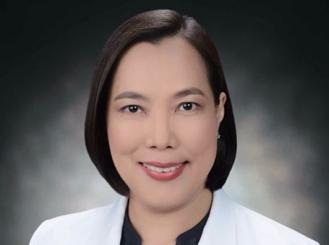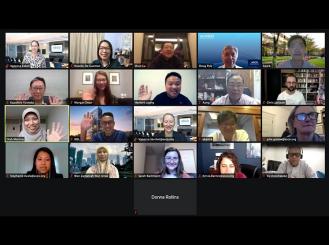Jan 14, 2022
By Roselle De Guzman, MD
In the spring of 2019, as I was checking my email inbox, I received an invited appointment to the new ASCO Asia Pacific Regional Council, the first regional council launched by ASCO. The council’s role is critical; it advises ASCO on the needs and challenges of members in the region and deepens their engagement in the Society’s global activities. It is an honor to join this group of distinguished oncology leaders from countries in the Asia Pacific.
Our region is vast. It stretches northward to Mongolia, southward to New Zealand, eastward to the island states of Oceania, and westward to Pakistan. But more than the geography, Asia Pacific is the most diverse region of the entire world in terms of culture, government, language, our economies, our income levels, and so many other aspects.
ASCO has been truly committed to embracing diversity, equity, and inclusion. Being part of the regional council gives the advantage of getting a wider range of perspectives and an infusion of fresh ideas. Our diversity is not merely in our surface-level demographics, but a deep-level diversity that involves our attitudes, beliefs, cognitive abilities, and values. It is a unique experience to have knowledge-sharing between our cultures and listen to the challenges that each of us face in our regions. We represent our individual countries but work together as a regional team.
I consider every meeting of the regional council an opportunity to listen to different intelligent voices and new perspectives as we plan, brainstorm, and decide. We balance our differences with our collective focus on making important decisions that will impact the Asia Pacific oncology community. Teamwork within a global organization encompasses a nurturing work environment, accepting the unique differences of each team member, effective communication skills, and emphasizing the paths of moving to a global mindset from a predominantly domestic one. I was fortunate enough to have learned these lessons and principles firsthand.
I vividly remember one pleasant summer morning of 2014 in Alexandria, Virginia. As I stepped out of my hotel, I realized I was in a new place where I did not know anybody. I walked across the street feeling excited, nervous, and jet-lagged. I entered an office building and rode the elevator to the eighth floor. I was at the ASCO Headquarters. Being there for the first time is considered an extraordinary experience for most of us international members. This was one of the multiple occasions that I traveled halfway around the globe to participate in the Leadership Development Program (LDP).
Prior to this scheduled training session, I had the opportunity to meet our class and the ASCO leadership during the orientation session at the ASCO Annual Meeting in Chicago. I remember feeling intimidated. I felt I did not quite fit in, having a different background and unsimilar culture. These experiences deeply ingrained in me important leadership principles: Life is just uncomfortable. Be willing to embrace change. Be adaptable. Be willing to take risks and accept new challenges.
I have participated in the Society’s international programs, served on committees, advisory boards, and working groups. These have given me a good opportunity to meet and interact with high-profile people in the field of oncology, including ASCO presidents, senior staff, and members of the Board of Directors—and, of course, the supportive mentors of our LDP teams, Mark G. Kris, MD, FASCO; Anne Moore, MD, FASCO; and Hyman B. Muss, MD, FASCO. I have learned a lot about humility from many of these world-class leaders. They are the people who have done pioneering work, researchers who have made scientific breakthroughs, inspirational women and oncology luminaries, and yet they are not driven by ego. Humble leaders make the best leaders.
Many of the lessons I learned came from outside our formal curriculum. After one LDP training session in Virginia, my returning flight to Manila was cancelled due to inclement weather. I was advised by the airport ground staff to take the next flight the following day. That was not quite a viable option for me—with the time difference, it would mean additional days of being away from home and work. The airline staff was able to arrange the earliest available flight, but I would land at John F. Kennedy International Airport and take off for my next leg from Newark Liberty International Airport, 21 miles apart. With limited time to make my connection, I proceeded and luckily arrived on time for the flight. Life is a journey. Just like a typical long-haul flight, it is not always one smooth operation. Life will throw us a curveball. It has challenges that will test our tenacity, patience, and resilience. These are meant to hit us and mold us. These are transformational personal experiences that help us to grow outside ourselves.
As a woman in oncology, I had a share of the range of personal and professional challenges that other women in the field are also facing. The status and roles of Asian women are deeply rooted in centuries of cultural norms and strong traditions of male domination. Although the Philippines remains one of the most gender-equal countries in the world, gender inequality is still pervasive. Not so long ago, I was having a serious discussion with someone in a senior management position about my family-related issue. He said something to the effect of, “If you would do that, then better get out of this institution.” I wonder if I would be treated in the same manner if I were a man and was not a subordinate. I did what was right and just. It was such a liberating victory. Women’s roles in society and in the workplace should be increasingly recognized, and their hard work highly valued.
The Asia Pacific Regional Council has done tremendous work since its inception 2 years ago. What the council has accomplished so far has been built upon the foundation of the leadership of past chair Keunchil Park, MD, PhD, of South Korea. He has created a bridge of competence and commitment that helped the team move forward, and continues to lead us to stronger ground. The council moves multi-directionally in every discussion we raise and every decision we reach. We get up close to get granular in the details, and we go up high to have a bird’s-eye view and see how everything fits together.
In the book The Future Is Asian, author Parag Khanna, a leading global strategy advisor and geopolitical futurist, presents an irrepressible global “Asianization.” His detailed analysis includes the impact of the Asia Pacific region on the global economy, society, and governance. We are seeing this in many forms—recruitment of software engineers from India, selling commodities to China, recruitment of nurses and caregivers from the Philippines, hosting construction crews from Korea, taking vacations in Hong Kong, Indonesia, Japan, or Thailand, and other relationships. In spite of these known impacts, the stark reality of the situation is that Asia Pacific, especially its low- and middle-income countries, has been grappling with the cancer challenge. ASCO, with its diverse network of oncology professionals, volunteers, and dedicated and diligent staff, continues to provide expertise and take strategic initiatives to make a global impact to reduce the burden of cancer.
One key focus of the regional council is launching the LDP specifically for Asia Pacific. As the current chair of the regional council and past participant in the LDP, I am excited that the renowned program is now available for members in the region. Twelve young participants and future leaders in oncology have been selected. My message to the participants is this: Have a profound respect for this wonderful opportunity. Embrace it and dedicate to making the most of it. This same experience has given me a better and clearer appreciation of what true leadership must be. It is about behavior first, skills second. Leadership relies most strongly on less tangible and less measurable things: attitude, values, inspiration, personal character, and relationships. Prepare to learn powerful lessons that are truly long-term and with far-reaching benefits.
Dr. De Guzman is a medical oncologist and associate professor at the Manila Central University-FDTMF Hospital in the Philippines. She serves as chair of the ASCO Asia Pacific Regional Council and member of the Annual Meeting Scientific Program Committee. Previously, she has served on the International Affairs Committee, as well as other working groups and advisory panels. Follow Dr. De Guzman on Twitter @DrRoselleDG.


